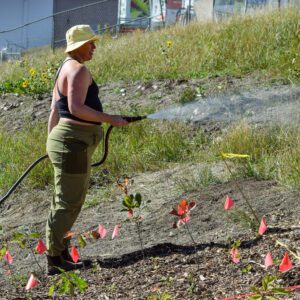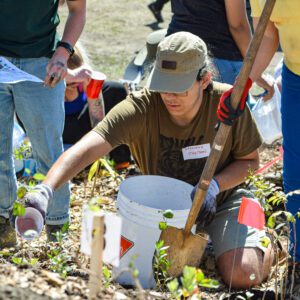The Manchester industrial area of southeastern Calgary is a grey locale with less than six per cent tree cover. In summer of 2023 Calgary Climate Hub transformed a 200m2 area at the Calgary Centre for Spiritual Living (CCSL), located in this neighbourhood, with a mini forest with support from the Living Cities Canada Fund.
The initiative introduced over 800 native trees, shrubs, and forbs, from 24 different native species to the industrialized cityscape.


The Project
The mini forest is planted on a south-facing slope of a collaborative site between the Calgary Centre for Spiritual Living, a nondenominational and inclusive spiritual center, and Root & Regenerate Urban Farms (RRUF), one of Calgary’s longest-running urban farms with a focus on regenerative farming.
The soil at the site — a sandy loam, with a thin (~6-8”) topsoil layer over a layer of cobbles — reflects both the industrialization that occurred in the area in the 1950s and the history of the site as an outwash channel. Given the challenges of the slope and these soil properties, a comprehensive site plan was developed with a landscape architect.
Unique features of the project include a gravel trench that runs alongside the length of the site, which promotes water infiltration through the slope, and construction of a berm at the slope’s base to enhance water retention and slope stability. A drip-irrigation system was also installed to combat water challenges amid the increasingly hot and dry summer months in Calgary.
CCSL and RRUF hope that the mini forest will act as a community hub by incorporating features such as benches and a labyrinth, fostering accessibility, and making it a welcoming gathering space. The initiative invites community groups and school classes to visit, mirroring the engagement practices established at RRUF.
Lessons Learned
Based on this initiative, the Calgary Climate Hub team would prepare the site further in advance of the planting date for future projects. This would allow the soil more time to settle and compact before planting.
Another learning was that adding too much mulch on the site before planting can have downsides. At this site that has an elevation, the mulch ended up getting buried in planting holes, especially on the steepest part of the slope.
Some other lessons learned in this project relate to volunteer engagement. The volunteer numbers for this planting were capped because of the safety concerns on the slanted site. But, the project leaders found that alternative activities — like setting up the planting grid or organizing the plants — can be arranged to engage more people.
One such activity was rock painting organized on the planting day. This was an additional way for people with limited mobility to be involved in the event.
“These mini forests sound quite straightforward when reading about them, but the projects have a lot of complexities and challenges; I am very glad that we had the support from the Living Cities Canada Fund and from Emily Amon and the people in the Mini Forest Community of Practice ! Without this support and the resources provided by Green Communities Canada, it would have been very challenging for our group to have successfully completed this project” – Heather Addy, Tiny Forests of Calgary Steering Committee Member, Co-Chair, Miyawaki Forest Project, Calgary Climate Hub
Final Thoughts
Calgary Climate Hub worked closely with members of the CCSL community, coordinating the mini forest planting to promote inclusivity and accessibility for diverse members of the community, including seniors, individuals with developmental disabilities and people with limited mobility.
Several volunteers who attended the event reported they felt connected to the earth and the community, and expressed interest in participating in future mini forest plantings.
Word about the project has spread around Calgary, and the Calgary Climate Hub has already received inquiries from other prospective partners to establish new tiny forests, including a local engineering firm, a post-secondary institution and a neighbouring municipality.
This project was supported by Green Communities Canada’s Living Cities Canada Fund.
